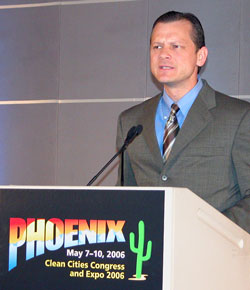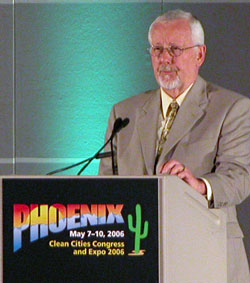 This morning’s opening session featured a speech by J.J. Brown, Legislative Aide for Utah Senator Orrin Hatch. He just finished.
This morning’s opening session featured a speech by J.J. Brown, Legislative Aide for Utah Senator Orrin Hatch. He just finished.
This is a long audio file but I think he gave an excellent talk putting into perspective the oil and energy situation on a worldwide level.
Some points that he made include the following. He wanted to bust the myth that oil company profits and the salaries of their CEO’s is responsible for the high price of gas. It’s just not true. He said that taxing oil company profits and giving that money to tax funded government programs like Medicare won’t help generate a single drop of oil. The real reason behind oil price increases he says is the supply and demand situation. Demand is outpacing supply. Simple economics. In fact, he says that the only way our oil companies can hope to compete and develop new resources is with profits which are a result of demand.
One point he made that I thought helped put things in perspective is how much of our world’s oil supply is owned by governments. Our government owns none by comparison. Our oil companies own a fraction of the current oil supply.
In the short term he thinks alternative fuels will go a long way to help us feed our hunger for fuel. He said that his boss, the Senator, fully supports renewable fuel alternatives and providing assistance to companies and organizations who want to build facilities to develop the various alternatives.
I recommend you listen to his talk:  JJ Brown Speech (30 min MP3)
JJ Brown Speech (30 min MP3)
Domestic Fuel coverage of the Clean Cities Congress is made possible by the following sponsors:




 Speaking of alternative fuel vehicles. Here’s another way to get around in Phoenix without too many noxious gas emissions.
Speaking of alternative fuel vehicles. Here’s another way to get around in Phoenix without too many noxious gas emissions. One of the ways we moved people here at the Congress was with a Hybrid Bus that took us out to the opening reception.
One of the ways we moved people here at the Congress was with a Hybrid Bus that took us out to the opening reception. Increased awareness of domestic fuel alternatives is helping organizers of the 2nd Annual
Increased awareness of domestic fuel alternatives is helping organizers of the 2nd Annual  This has absolutely nothing to do with alternative fuels unless you consider that this blogger needed “fuel” and got it in the form of some fine Irish stew at
This has absolutely nothing to do with alternative fuels unless you consider that this blogger needed “fuel” and got it in the form of some fine Irish stew at  Our keynote speaker at lunch today was Robert Howard, VP of Corporate Planning and Logistics for
Our keynote speaker at lunch today was Robert Howard, VP of Corporate Planning and Logistics for  As I mentioned in an earlier post today,
As I mentioned in an earlier post today,  Right now there are numerous workshops and sessions taking place here at the Congress. I wish I could cover them all. Pictured here is Robert Jay Gordon, President/Co-Publisher of
Right now there are numerous workshops and sessions taking place here at the Congress. I wish I could cover them all. Pictured here is Robert Jay Gordon, President/Co-Publisher of  James Boyd is a member of the
James Boyd is a member of the